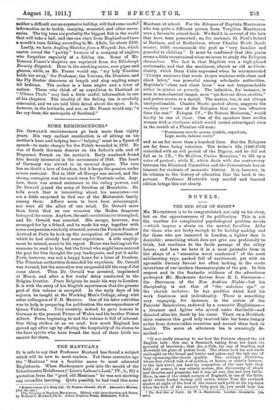THE MANTUAN.t IT is safe to say that Professor Mustard
has found a subject which will be new to most readers. Yet three centuries ago the " Mantuan " was a familiar name to most educated Englishmen. When Shakespeare puts into the mouth of the Schoolmaster Holofernes ("Love's Labour's Lost," IV., ii, 95) a quotation from the "good old Mantuan" he was not showing any recondite learning. Quite possibly he had read this same * Reminiscences of a Busy Life. By Eugene Oswald, Ph.D. Alexander DIoring. Iles. 6d. net.] fThe Eclogues of Baptista Mantuanus. Edited, with Introduction and Notes, by Wilfred P. Mustard, Ph.D. Johns Hopkins Press, Baltimore, U.S.A.
Mantuan at school. For the Eclogues of Baptista Mantuanus who was quite a different person from Vergilius Mantuanus were a favourite school-book. We find it in several of the lists that have been preserved; as, for instance, St. Paul's School at Durham, and at Rotherham, where Charles Hoole (head. master, 1660) recommends the poet as " very familiar and graceful to children." It must be confessed that this praise seems a little overstrained when we come to study the Eclogues themselves. The fact is that Baptista was a high-placed ecclesiastic, and that the sentiment, almost as old as Chris- tianity, which Dean Colet expressed when he recommended " Cristyn auctours that wrote theyre wisdom() with clene and chest laten," was powerful among scholastic authorities. Baptista's " clene and chest laten " was not irreproachable either in syntax or prosody. The infinitive, for instance, is seen in non-classical usages, as in "qui flectere divos creditis," and postea occurs as a dactyl. The matter, too, is not always unobjectionable. Charles Hoole, quoted above, suggests the reading over " some of the Eclogues that are less offensive than the rest." Eclogue IV., "De Nature, Mulierum," would hardly be one of them. One of the speakers here reviles women with a virulence which would sound extravhgant even in the month of a Plautine old man : "Femineum servile genus, crudele, superbum,
Lege, modo, rations caret,"
and so on for more than a hundred lines. But the Eclogues are far from being valueless. The writer's life (1448-1516) coincided with an evil period of the Papacy, and he did not fail as in IX., " De 3/forams Curiae Romanae," to lift up a voice of protest; while X., which deals with the controversy between the Discalced Carmelites and the Conventuals has an interest for students of monastic history. It is, however, in its relation to the history of education that the book is im- portant. Professor Mustard's very careful and learned edition brings this out clearly.


































 Previous page
Previous page